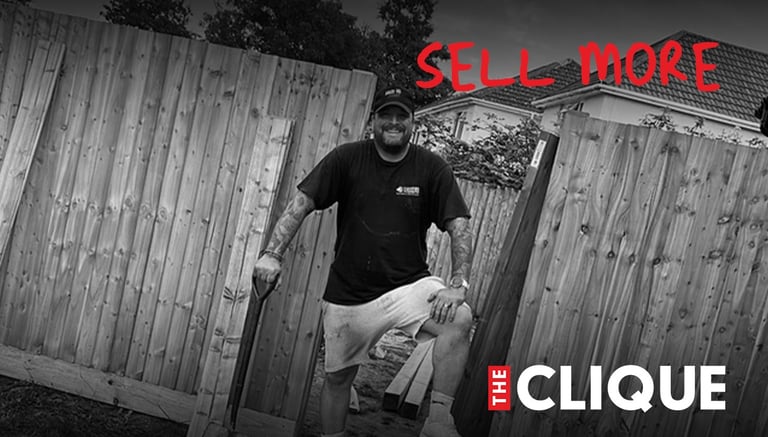Four ways to sell more.


// I can’t sell.
You think selling is a dirty word and you have an out of body experience every time you think of yourself selling because you picture yourself as a sleazy suited double glazing salesman who won’t stop until he’s (or she) has got the sale.
If this is you, then stop.
Sales isn’t dirty - it’s your perception of it.
You are sold to everyday and everyday, you act like the customer and you slam that phone down, close that door, say ‘no thankyou’ to those people on the street who want you to sign up for charity donations and then there is your kids - they know every trick in the book to close that deal.
Don’t get me wrong, if your product or service is particularly crap then you should probably stop trying to flog it and then you’ll be well within your rights to feel like people don’t want it - because, they probably don’t.
Also - if all you do is wait for inbound leads which you then contact and you offer and close, again, thats not selling - thats taking an order.
If you’re product or service is good and it solves a problem for your prospective client, you’d be doing your clients a complete disservice if you didn’t offer them that solution.
If you’re creating value or solving a problem - it’s not being salesy, it’s being a consultative seller.
// Telling isn’t selling.
I get it, your product is INCREDIBLE and you have PASSION for it - your product is something you have worked hard on for years, honing it and refining it so it’s just perfect for your client and you need to tell them everything about it - all the features, bells and whistles and they need to know it NOW.
Except, they don’t.
You can’t just tell someone that they need your product or service because they will revert back to the belief that you are selling to them - they will literally see you as that double glazing salesman (or woman..) and nothing will change that.
But, if you decide to listen more than you talk then wonderful things happen.
The first and easiest way to do this is to ask more questions at the start of your conversation (and it is a conversation) with your client - ask them about the problem your product will solve and then begin tailoring questions around the particular nuances of your product so that you lead your client towards the solution you offer.
As with children and anyone else you want to teach, when you allow themselves to uncover the solution for themselves, the sale happens all by itself and incredibly, it’s their idea and not yours.
// Reframe their minds.
Another way to increase your sales potential is to reframe your offer - what do you mean I hear you ask?
Well - you may be completely used to offering your clients a solution based on your product or service and your product may be able to sell itself on the features alone but have you wondered why you don’t close as many deals as you’d like?
Take your proposal in a different direction - focus on the value your product is going to create.
Start by chatting about the common problems and the issues that your solution will solve and then introduce your product as a way to solve that issue - then introduce metrics and data to back up your claims, showcasing the positive impact that your solution will have their business. If that means it’s revenue or time saved, these metrics and real tangible benefits to a business are impactful - it shouldn't all be about the price but also the value you’re creating within a business.
A simple reframe away from one which is feature driven to a more value based proposition is something that can really hold benefits as you’re immediately creating a solution which is not just focused on the level of investment that the clients need to make.
// Create content.
There is no doubt.
Creating content around the problem that you solve is the best way to attract further clients and offer your sales process a lifeline as you’ll get to showcase that you actually know what you’re talking about.
One of the biggest critiscms you’re thinking (and I know it because I thought about this before I started) is that all your prospective clients are going to steal all your ideas, all your knowledge and all your methods if you post about them and you’re right - there are some that will steal your processes.
They will identify the value that you’re sharing and use it in their business - maybe successfully, maybe not.
But are those the types of clients you want in your business? Probably not.
But there will be potential clients (and those clients who you’re involved with) who recognise the value of what you’re offering, of what you’re talking about and most importantly, have the budget to spend to get you to do it for them.
Thats the key - the clients who have the budget, recognise the value you offer and want to work with you are the ones that you want to be involved with - thats why you’re posting the content.
// Work in Abundance
When you were younger, can you remember the aftershave that your dad wore? My dad wore Old Spice - he (as I do now) would have a messy wet shave - shaving cream everywhere and his neck bleeding from the crappy single use razors that they sold in the late 80s and then you would hear the bathroom door unlock, the steam escaping from the top of the door as he opened it up and as he would stomp across the landing but along with the steam, I’d catch a whiff of that recognisable scent of Old Spice and it will forever be associated with that memory.
But as I can recognise that scent of my dads aftershave, your clients can recognise the scent of desperation.
When you’re working in a position of necessity and you need that deal to make or break your business, you might as well have had a shave with my dad because the stench is just the same.
Your clients can see it, smell it and they have the second sense that something is up.
The problem is when you’re so busy working on multiple deals, that smell isn’t there - you have the air of confidence and your clients want to work with you. So in all that you do, you have to mask that smell of desperation.
There are two ways you can do this - the first is actually having an abundance of opportunity but life isn't perfect so we sometimes need to fake it - this means focusing on the value you’re offering and sticking to your price (no matter what).
It also means doing the unthinkable - walking away from a deal which doesn’t serve you. If you’re client wants to lower the price to a point which doesn’t work for you, then walk away.
Yes, this may mean moving away from clients with who you want to work with - but its for your own good.


